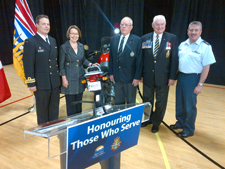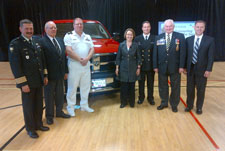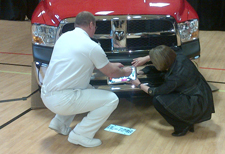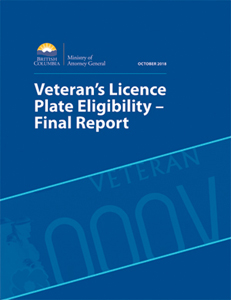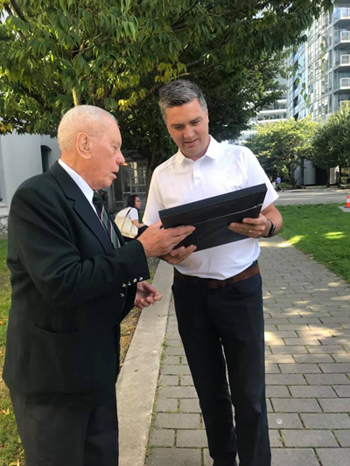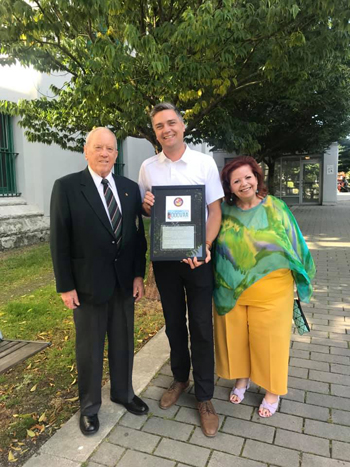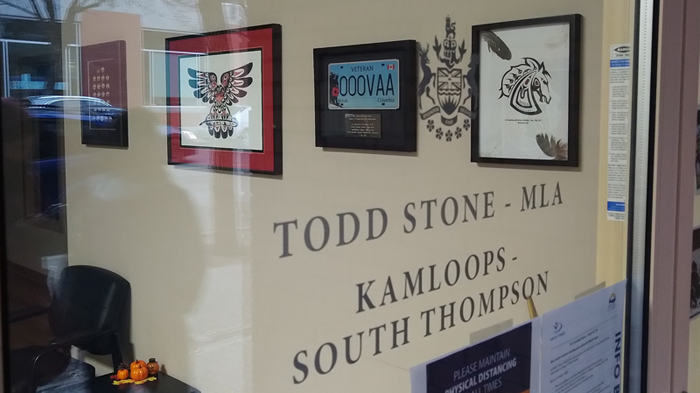|
British Columbia Veteran License Plates
|
||||||||||||||||||||||||||||||||||||||||||||||||||||||||||||||||||||||||||||||||||||||||||||||||||||||||||||||||||
On July 23, 2018, the provincial government announced it was conducting a survey in order to seek "feedback from British Columbians about whether they
think the existing criteria for the Veteran’s Licence Plate program should be
changed to include police officers, or whether it should remain the same". |
Despite the program being administered by the British Columbia Veterans Commemorative Association (BCVCA) since its inception in 2004, the province had been approached by, amongst others, the Royal Canadian Legion to expand eligibility for Veteran plates to police officers - specifically members of the Royal Canadian Mounted Police (RCMP). |
The pretext for this request was the absence of a "current consensus within Canada on the definition of a veteran". Despite a majority of provinces and territories not allowing RCMP to be eligible for such plates, the BC branch of the Legion advocated British Columbia adopt the same criteria as Quebec, Ontario, Nova Scotia and Newfoundland and allow RCMP to display Veteran plates: |
| Provinces & Territories in which RCMP are not eligible for Veteran license plates (2018): | |||
 |
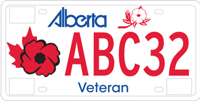 |
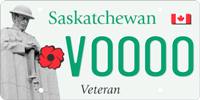 |
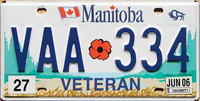 |
 |
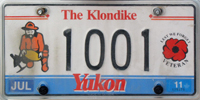 |
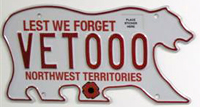 |
|
Provinces in which RCMP are eligible for Veteran license plates (2018):
|
|||
 |
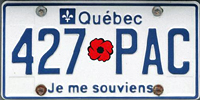 |
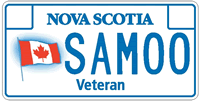 |
 |
* Nunavut does not issue a Veteran license plate as of 2018 |
|||
According to David Whittier, Executive Director of the BC/Yukon Command, "the RCMP deserves consideration. They are a
national force that has a long history of service
to this nation." |
One week later, after meeting with Attorney General David Eby, members of the BCVCA went public with their concerns that the proposed changes would debase the significance and importance of Veteran license plates: |
In the segment, Global reporter Richard Zussman states that the Legion has sent a letter to the BC government "suggesting that if Mounties [RCMP] are not accepted as part of the Veterans plate program they could ask the government to require the poppy to be removed from the plates." |
Whittier subsequently posted to the Legion web-site regarding the Global segment and did not take issue with the characterization of the possible revocation of the right to use the poppy symbol. |
And, with that, the political fight was officially on with members of the Official Opposition - most notably former Transport Minister Todd Stone - taking up the BCVCA cause: |
|
|
|
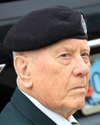 |
The Canadian Legion, its membership is failing and Canadian Veterans generally do not belong to the Legion anymore because it does not do anything for Veterans. Archie Steacy (BCVCA). |
 |
Basically, it’s a membership drive. ‘Join the legion and get your licence plate.' Sharel Fraser (BCVCA). |
 |
They view this extended eligibility of this licence plate as perhaps one means of enhancing the long-term viability of Legions. Todd Stone (Liberal MLA). |
 |
The veterans licence plate program was designed to honour the men and women who have served on our behalf. It is important to retain the specific recognition for veterans ... Shirley Bond (Liberal MLA). |
The Legion’s position is that we would like to see the Legion definition of veteran be used as the
criteria for deciding whether or not to issue veterans plates. |
 |
I recognize that veteran licence plates are an important and meaningful issue to veterans and their families. David Eby (NDP MLA). |
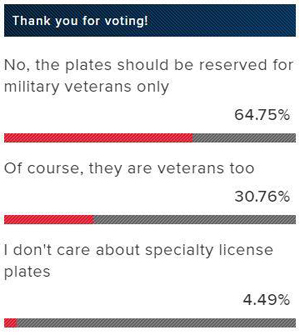 |
|
| For posterity, we have archived the informal, completely un-scientific Survey that was prepared by the provincial government in relation to the proposed inclusion of RCMP officers into the definition of "veterans". According to news reports, the government has advised veterans that it is only accepting on-line submission via the survey site. “Good luck with getting a 95-year-old, who has never touched a computer, to fill out an online survey" was the response of Richard Hourie, Vice President of the BCVCA. | As part of its coverage of this story, Global News decided to ask its readers to participate in an informal, completely un-scientific poll about whether the RCMP should be eligible for Veteran license plates. As of August 15, 2018, respondents were opposed to defining the RCMP as "veterans" by a margin of 2:1 (see above). |
We here at BCpl8s.ca fully support the BCVCA's position and believe that this controversy was wholly avoidable by the provincial government but does present an opportunity to right an existing wrong in terms of who is eligible for a Veteran license plate. |
Lest we forget ... |
Accordingly, a "veteran" was defined by ICBC as someone who served during wartime; in a post-war capacity; or during a NATO or UN operation. While this definition included members of the RCMP or a municipal police force (i.e. City of Vancouver Police Department personnel), these officers must have served in a NATO or UN operation to be eligible for Veteran plates. |
In license plate lingo, this made the Veteran license plate a "restricted optional plate", meaning an applicant is required to demonstrate that they meet the criteria of a "veteran" through past military service. |
The Veteran plate program is not managed by the BC Government or ICBC, but is sustained by a "Herculean" volunteer effort of BCVMA members, veterans themselves, "who meet every week to review applications, verify eligibility documentation and authorize approval for final issuing of a [plate]." |
It would seem, however, that this limited eligibility criteria did not suit the interests of all potential stakeholders as the Royal Canadian Legion would soon to begin lobbying for changes to the program - which leads us to the first wrong committed against the Veteran plate: |
| Is it a "Veteran" or a "Military" License Plate? |
In the Canadian vernacular, a "veteran" is generally understood to be someone who formerly served in the Canadian Armed Forces, which makes the June 29, 2012, announcement by the provincial government that it was expanding eligibility for the Veteran license plate to include currently serving members of the Canadian Forces a true head-scratcher. |
| To mark "B.C. Legion Week" in 2012, the provincial government held an event in Vancouver to announce that, starting September 1, 2012, currently serving members of the Canadian Forces - both regular and reserve - would be eligible for Veteran license plates. Representing the government that day was (then) Minister of Justice and Attorney General, Shirley Bond. | ||
Apart from the obvious misnomer of labeling an active member of the armed services a "veteran", the decision was not really consistent with the original intent of the Veteran plate. |
While the Royal Canadian Legion advocated for the change on the basis that this would bring "BC in line with other provinces that offer veteran's licence plates active Canadian Forces members" it is felt the decision was driven as much by the technological limitations of ICBC's computer systems in 2012 (as it had just embarked on its "Transformation 2014" program at that time). |
In short, shoe-horning current military personnel into the definition of a "veteran" was potentially easier than creating a whole new plate category for these types of individuals under existing computer programs used at the Corporation. |
In the interim, and as we have written about elsewhere on BCpl8s.ca, a number of Western province's have taken the more sensible approach of creating "Support Our Troops" plates that can be used by Canadian Forces members, their families and the general public to show their support and gratitude to those who serve: |
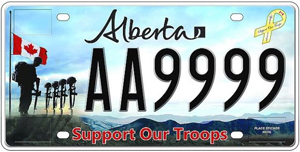 |
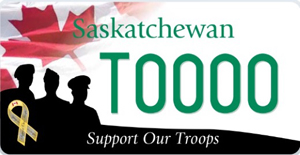 |
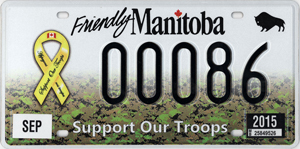 |
Granted, these Support Our Troops plates are not as exclusive as the Veteran plate as any motorist in provinces that offer them can apply to have one for their vehicle, but they are as equally generic as the Veteran plates (i.e. they do not distinguish between branches) and the Veteran plate would still be available to Canadian Forces members once they finished their careers in the military. |
| The Legion's affinity for license plates |
The other head-scratching aspect of this whole episode is that it was completely avoidable had the provincial government adhered to its own policy for the creation of new specialty license plates (which ICBC insists on referring to as "affinity" license plates). |
Only 15 months earlier (April of 2017), ICBC had announced the creation of an "Affinity License Plate" Program and sought expressions of interest from sponsoring organizations seeking to create their own specialty license plates for fund raising purposes. |
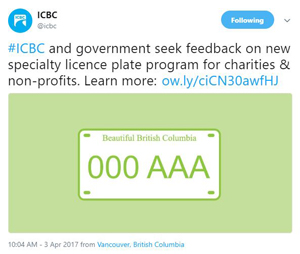 |
At left is the generic BC license plate graphic used by ICBC to announce the "Affinity Licence Plate" Program in April of 2017 (rather dull isn't it?). |
ICBC was expecting applications from not-for-profit "member-based organizations ..." (which captures the Legion) who would have to commit to allocate all proceeds to charity or a not-for-profit use, put down a bond of $5,000, submit a draft plate design as well as a marketing plan for selling 2,500 plates over the proceeding 3 years. |
Rather than affording the Legion special treatment by proposing to amend the definition of a "veteran" (again!), the government should have re-enforced that any proposal for new specialty plates (and that this should include changes to existing specialty plates) be handled through the "Affinity" Program. |
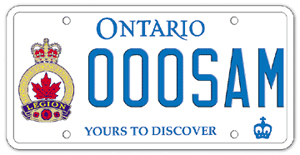 Not only would this have preserved a level playing field, but it would have afforded the Legion a much wider latitude to consider creative options for how best to serve its members with a license plate. For instance, the Legion could have petitioned the government for its own plate as has been done by the Ontario "Command" and numerous Legion "Departments" in the US: Not only would this have preserved a level playing field, but it would have afforded the Legion a much wider latitude to consider creative options for how best to serve its members with a license plate. For instance, the Legion could have petitioned the government for its own plate as has been done by the Ontario "Command" and numerous Legion "Departments" in the US: |
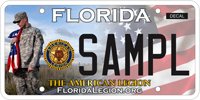 |
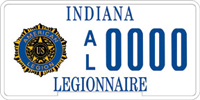 |
 |
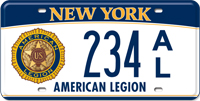 |
 |
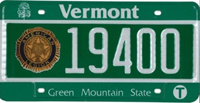 |
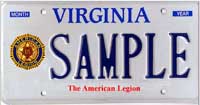 |
 |
Alternately, if the Legion truly believes that the RCMP deserve recognition on a license plate, they could have applied for a "Law Enforcement" plate as is also common in many US states, including our neighbours in Washington: |
 |
 |
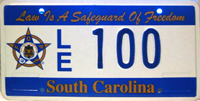 |
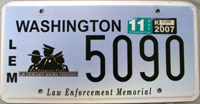 |
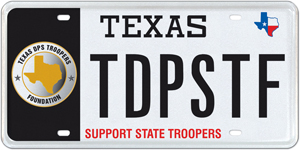 Such plates, however, come with their own potential risks. In 2012, the State of Texas, in a rare move, rejected a proposed Texas Department of Public Safety (DPS) Troopers Foundation license plate in a deadlocked vote due to apparent concern that the plate could give the impression that those displaying it would receive favoured treatment from state troopers (i.e. leniency in ticketing traffic violations, etc.). Such plates, however, come with their own potential risks. In 2012, the State of Texas, in a rare move, rejected a proposed Texas Department of Public Safety (DPS) Troopers Foundation license plate in a deadlocked vote due to apparent concern that the plate could give the impression that those displaying it would receive favoured treatment from state troopers (i.e. leniency in ticketing traffic violations, etc.).
The possibility of such favouritism, or "professional courtesy" is not as far-fetched as one might think. Anecdotal evidence of law enforcement employees and their family members attempting flag their status has ranged from the use of blue and black tape on windshields (Massachusetts), the passing of "get out of jail free" cards (New York) to the affixing of union medallions directly onto a license plate (Florida). |
While the seeking of privilege has generally been denied in all of these instances, such protestations do not adequately dispel the perception that special treatment is the driving force motivating these practices. And what could convey a special status better than a restricted optional specialty license plate? |
A further consideration is the slippery-slope argument, which is particularly pronounced when it comes to recognising groups and organisations with their own specialty license plate (especially when politicians are directly involved in the decision-making process). |
While examples abound across North America, one only need look to Manitoba - whose specialty license plate program experiences ICBC has drawn upon in formulating its own "Affinity" Program - and how it has also created license plates for Firefighters and Paramedics (but, notably, not law enforcement), after creating "Veteran" and "Support Our Troops" plates. |
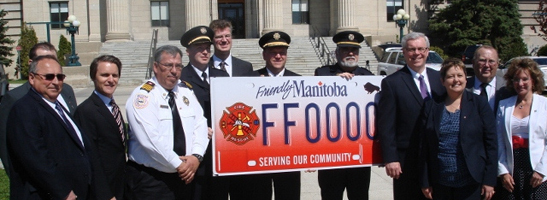 |
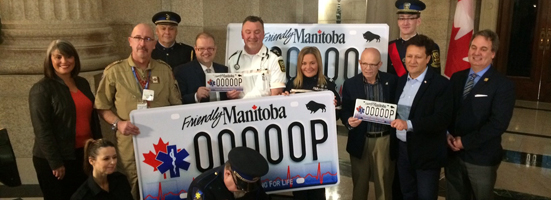 |
These are not necessarily undesirable themes for license plates, but if a concern is the proliferation of different license plate designs or of having to administer and maintain stock for a plate type that might only be issued to a couple of thousand motorists, then establishing robust procedures for dealing with such requests becomes important. Otherwise, government will continually be dealing with ad-hoc requests such as those by the Legion. |
| Summary |
At a minimum, the Legion's request to expand the definition of "veteran" should be refused by the government and that the Legion be encouraged to submit its proposal for a specialty license plate for law enforcement officials (or Legion members) to ICBC during its next intake of "Affinity Licence Plate" applications so that it may be properly adjudicated through this program. |
More importantly, however, the government should use this opportunity to restore the intent of the Veteran license plate to recognise former members of the Canadian Forces and, if need be, create a new military license plate to recognise the service of all current members. |
| Postscript (Part 3) |
Although unrelated to BC, in November of 2020 the Province of Alberta announced changes to its Veteran license plate program to allow retired RCMP officers to display its Veteran plates. |
According to Service Alberta Minister Nate Glubish, the announcement was about paying respect to and giving recognition to the hardworking women and men who serve Albertans to keep us safe. |
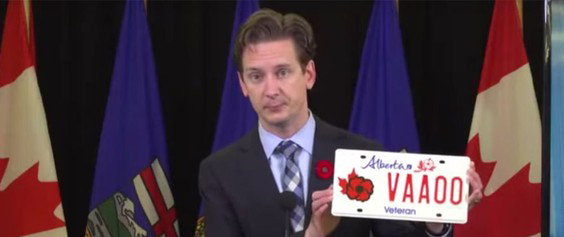 |
Of more interest, John Mahon, the President of the Royal Canadian Legion’s Alberta-NWT Command, decalred that he was pleased to see RCMP officers welcomed into the program as this brought the licence plate program in line with the legion’s membership guidelines. |
Apparently the Royal Canadian Legion updated its definition of “veteran” following the fatal shooting of three RCMP officers in Moncton, N.B., in 2014. Shortly thereafter, members of the legion and the RCMP began asking Alberta’s government for the program to be expanded to relfect this. |
Antique | APEC | BC Parks | Chauffeur Badges | Collector | Commercial Truck | Consul | Dealer | Decals | Driver's Licences | Farm | Ham Radio | Industrial Vehicle | Keytags | Lieutenant Governor | Logging | Manufacturer | Medical Doctor | Memorial Cross | Motive Fuel | Motor Carrier | Motorcycle | Movie Props | Municipal | National Defence | Off-Road Vehicle | Olympics | Passenger | Personalized | Prorated | Prototype | Public Works | Reciprocity | Repairer | Restricted | Sample | Special Agreement | Temporary Permits | Trailer | Transporter | Veteran | Miscellaneous |
© Copyright Christopher John Garrish. All rights reserved.


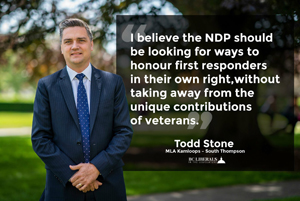
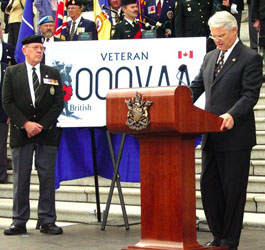 At the unveiling of the Veterans plate in 2004, its purpose was explicitly tied to the 60th anniversary of the D-Day Invasion of Europe by Allied troops and the contribution of Canadian service men "who left our shores, who left the peace of Canada to protect the peace of the world and to protect the freedoms which the entire would celebrate" (Premier Gordon Campbell).
At the unveiling of the Veterans plate in 2004, its purpose was explicitly tied to the 60th anniversary of the D-Day Invasion of Europe by Allied troops and the contribution of Canadian service men "who left our shores, who left the peace of Canada to protect the peace of the world and to protect the freedoms which the entire would celebrate" (Premier Gordon Campbell). 